A year after the AI boom, we talk about how AI is being used in the professional short-term rental sector. The session revealed that there are still more questions then answers in our industry in leveraging AI for the business. Despite major advances in technology last year, it’s still hard to identify complete successes or failures with AI in STR. There are increasingly more content generation, productivity, analytical, and other tools available for short-term rental managers. However, hospitality operators need to do thorough preparation to effectively use AI in their business and achieve the desired ROI. We presented a 5P plan for implementing AI in a property management business to maximize the benefits of AI in 2024. This plan included defining your purpose, training your people, setting up processes like centralizing data, implementing platforms and measuring performance.
Webinar Speakers

Francois Gouelo, Cofounder and CEO of Enso Connect
As a bright tech founder and expert, Francois has been at the forefront of the intersection of technology and hospitality. Enso Connect is a guest experience platform, leveraging AI and If-This-Than-That logic to connect, streamline and monetize guest experience. The platform is renowned for its AI-driven unified inbox, which integrates SMS, WhatsApp, emails, and Airbnb messaging. Another prominent feature is the highly customizable guest app, the Boarding Pass. These and other unique capabilities make Enso Connect the most configurable guest experience software for the short-term rental industry.
Enso Connect is celebrated for its AI-driven unified inbox, which seamlessly integrates multiple communication channels including SMS, WhatsApp, emails, and Airbnb messaging. This unified approach allows hospitality operators to manage guest interactions more efficiently and effectively, ensuring a smooth and cohesive communication experience.
Another standout feature of Enso Connect is its highly customizable guest app, known as the Boarding Pass. This app offers unparalleled flexibility, allowing property managers to tailor the guest experience to their specific needs and preferences. Whether it’s providing personalized recommendations or managing booking details, the Boarding Pass app enhances guest satisfaction and engagement.
These innovative features, combined with other unique capabilities, position Enso Connect as the most configurable guest experience software in the short-term rental industry. By leveraging the power of AI and advanced technology, Francois and his team are redefining how hospitality businesses connect with and serve their guests.
Larry Hoffer, Founder and CEO of The Rentalz Company
Larry has over 20 years of experience in the domestic vacation rental industry. The Rentalz Company is deploying a suite of technology solutions for vacation rental managers, including generative AI solutions for hospitality. The Rentalz Company launched an AI product for vacation rental managers, called Jini. Jini delivers guest engagement experiences and a content generation and optimization solution.
Jini represents a significant advancement in vacation rental technology, offering a powerful suite of tools for enhancing guest engagement and optimizing content. This generative AI solution is designed to elevate the guest experience by providing personalized interactions and automating content creation. Jini’s capabilities include crafting tailored messages and optimizing content for better engagement, ensuring that vacation rental managers can effectively connect with their guests and meet their unique needs.
With Larry’s extensive experience and The Rentalz Company’s cutting-edge technology, Jini stands out as a transformative tool in the hospitality sector, helping vacation rental managers streamline their operations and enhance their guest interactions.
Braeden Flaherty, Hospitality Program Manager, Aidaptive
As Predictive Hospitality expert, Braeden uses his experience as a product leader in some of the most successful hospitality technology companies. Aidaptive transforms vacation rental management direct booking businesses with OTA-grade machine learning (ML). They enable vacation rental managers to personalize every guest booking journey to drive repeat and direct bookings at scale. Aidaptive uses AI to deliver personalized experiences at scale for the hospitality and e-commerce Industries.
Aidaptive is a game-changer for direct booking businesses in the vacation rental industry, bringing OTA-grade ML capabilities to the forefront. By harnessing the power of AI, Aidaptive enables vacation rental managers to tailor every guest booking journey with unprecedented precision. This personalized approach not only enhances the guest experience but also drives repeat and direct bookings at scale, setting new standards for guest engagement and retention.
In addition to its impact on vacation rentals, Aidaptive’s AI-driven solutions extend to the broader hospitality and e-commerce industries. By delivering highly personalized experiences, Aidaptive helps businesses create meaningful connections with their customers, ultimately fostering loyalty and boosting revenue.
Braeden’s expertise, combined with Aidaptive’s innovative technology, is reshaping how vacation rental managers approach personalization and guest engagement in today’s competitive market.
Watch the webinar recording
TL;DR: Key Takeaways from the Webinar
Understanding Different Types of AI
We began with an overview of different types of artificial intelligence, to better understand its industry use. The three types of artificial intelligence are: Narrow AI, General AI, and Super AI.
Narrow AI
A specialized system is designed to address a single, well-defined problem and operates within a constrained scope, focusing exclusively on that specific issue. One notable example is IBM’s Deep Blue, the supercomputer developed specifically to play chess. Deep Blue’s expertise was confined to chess, and it was engineered with the sole purpose of mastering the game through advanced algorithms and processing power. Its success in defeating world champion Garry Kasparov in 1997 exemplifies the effectiveness of a specialized system in excelling within its narrowly defined domain.
Such specialized systems, while limited in their applications, demonstrate exceptional proficiency in their targeted areas. They leverage deep, focused capabilities to solve problems with high efficiency, but their scope does not extend beyond their designated function. This approach contrasts with more general-purpose systems that aim to tackle a wider range of tasks but may not achieve the same level of specialization.

General AI
This type of AI mimics human-like cognition, capable of performing a broad range of tasks. The most famous example is ChatGPT.
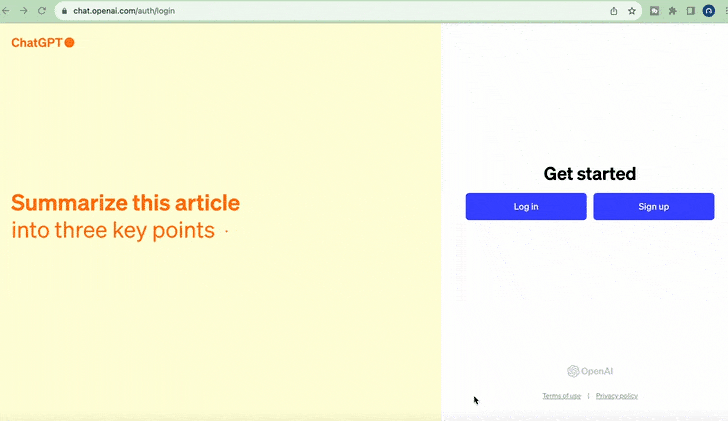
Super AI
Highly advanced, capable of surpassing human intelligence across a broad range of activities. This is, for now, just a fictional movie character, like the Terminator.
We focus on Narrow and General AI applications in hospitality.

Macro Trends in AI Adoption by the Hospitality Industry
The experts shared significant trends in AI adoption within hospitality that are transforming the industry. It is clear that more and more operators are implementing AI to increase productivity and boost revenue. Here are the main trends and stats we discussed:
- AI and machine learning are leading business strategies for 73% of hospitality decision-makers in 2024.
- There has been a notable shift from a focus on cybersecurity to AI.
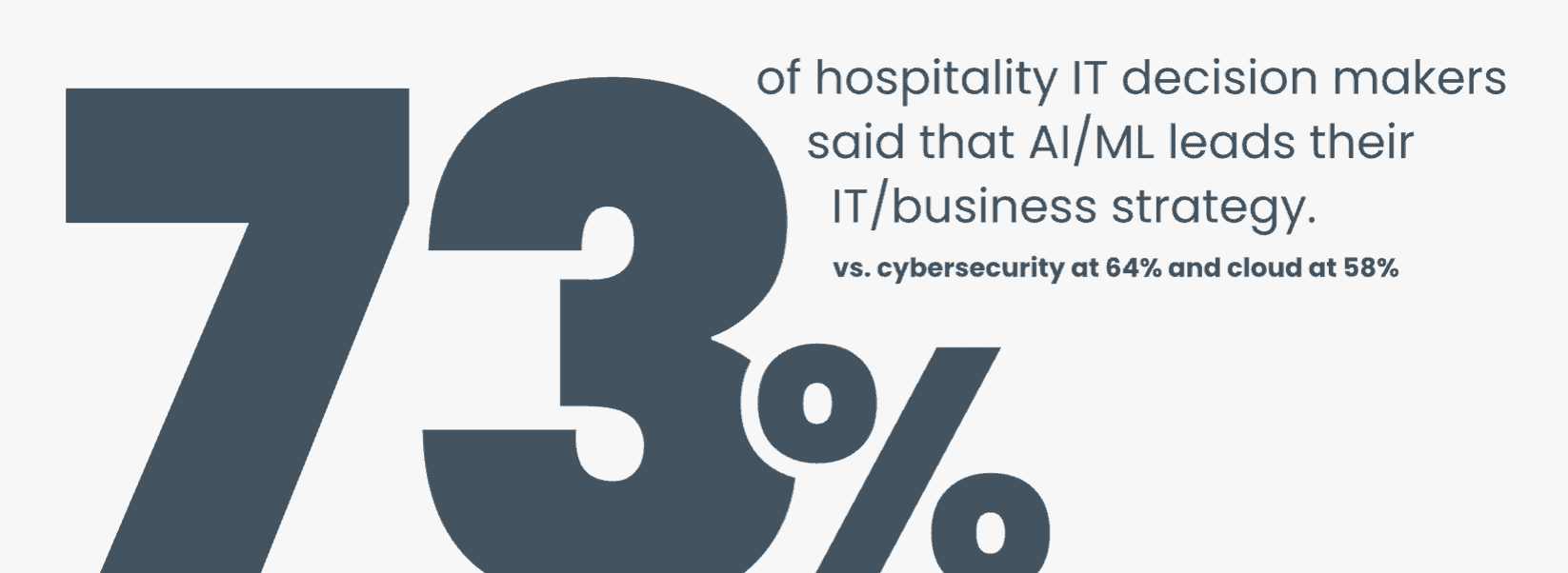
- Adoption of AI in hospitality has been increasing yearly, with a significant percentage of operators now using AI in some capacity.
Over a third of the operators started using AI a year ago
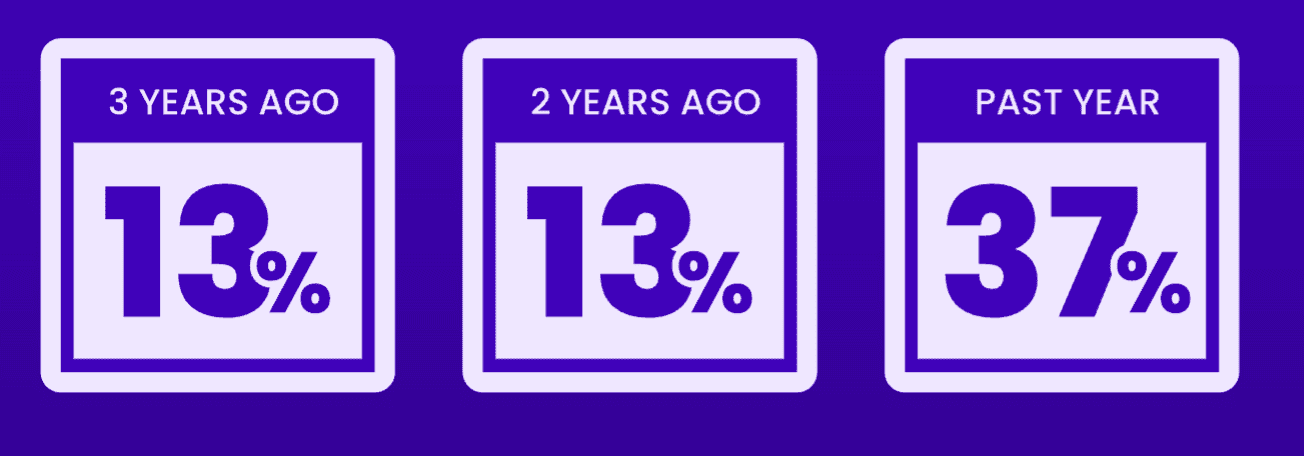
- AI’s influence on travel industry revenues is growing, with projections indicating a substantial impact by 2024.
Estimated Travel & Hospitality AI Market Growth – $1.2 billion by 2026 at CAGR 9.7%. Source: Travel & Hospitality AI Market Forecast 2025-2032 by IndustryArc
% of AI Influence on the Travel and Hospitality Industry
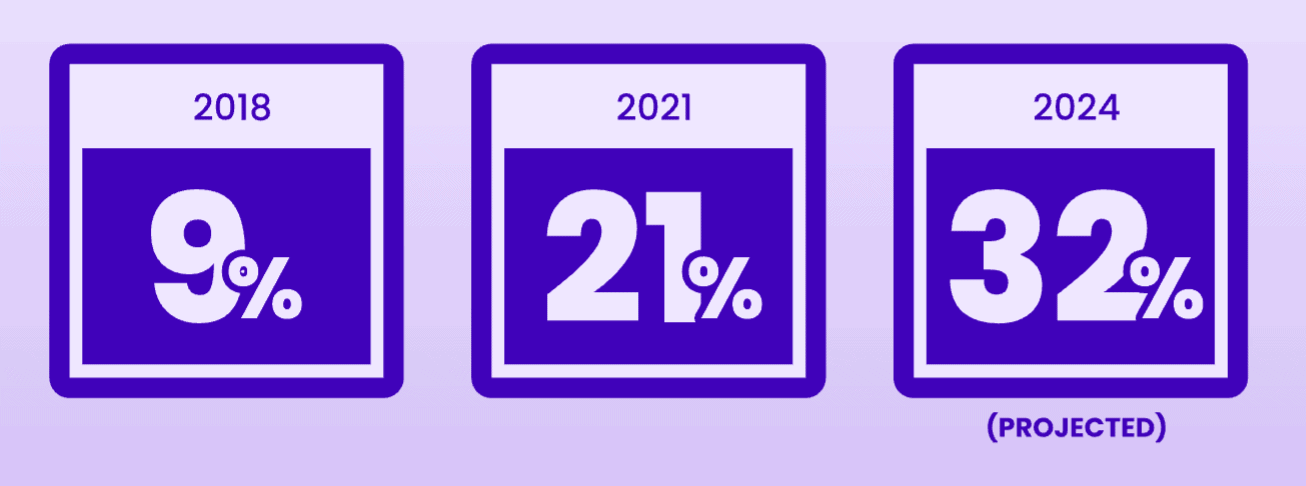
The AI Adoption Curve in the Hospitality industry graph highlights the progression of AI. It has moved from being a niche interest for innovators and early adopters to more widespread use.
AI Technology Adoption Life Cycle | Graph
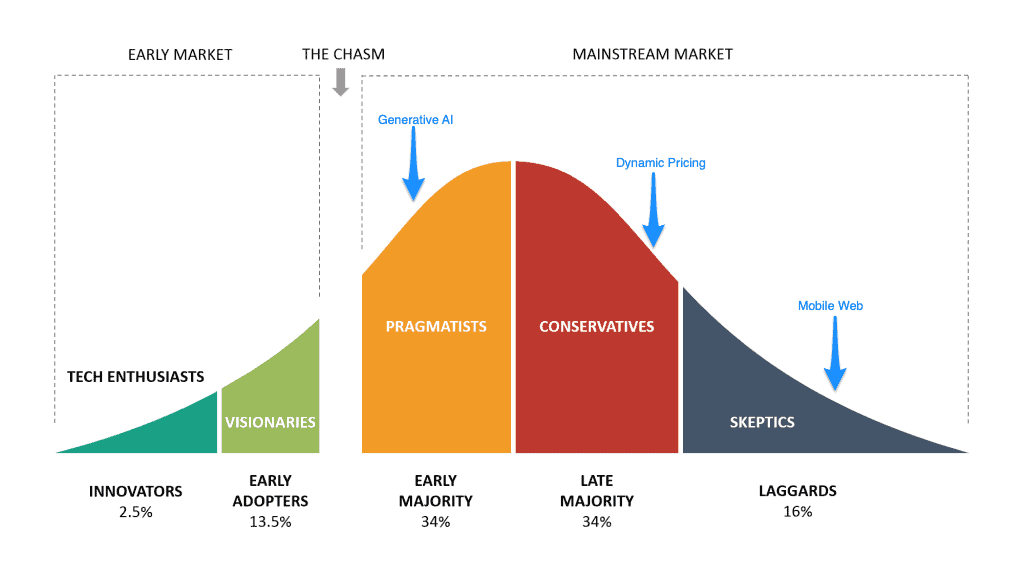
Initially, AI in hospitality was embraced by technology enthusiasts and forward-thinking businesses. Generative AI, exemplified by tools like Grammarly and later ChatGPT, crossed the threshold into broader market acceptance. AI applications are growing rapidly, as seen in ChatGPT’s swift user increase. This signifies AI’s progression into the adoption curve’s early majority phase.
-
- The adoption curve is becoming shorter and steeper, making new technologies available more quickly to smaller players in the industry.
- Large vacation rental operators adopted AI early, integrating it into their standard operating procedures.
- The industry sees a range of adoption levels, from tech-savvy operators to those unaware of AI’s existence.
- AI applications have extended beyond basic tasks, impacting areas like revenue management, operations, and guest experiences.
- While generative AI is advancing, other AI types like video generation are still emerging.
We can see that AI’s real-world applications in hospitality are diverse and expanding. This growth indicates a shift from early adopters to mainstream acceptance.
AI’s Contribution to Growth in Short-term Rentals
The experts mapped out how exactly artificial intelligence contributes to the growth and efficiency of short-term rental businesses today. There are the following applications.
Revenue management
- Dynamic pricing
- Upsell opportunities + personalization
Operations
- Predictive maintenance
- AI co-pilot (productivity)
Guest experience
- Guest communication: AI-powered chatbots, messaging automation, guidebooks
- Guest sentiment + reviews
- Automation + Personalization
- Guest verification (security)
Marketing
- E-commerce personalization on direct booking websites
- General Communication
- Brainstorming, content creation, writing
Benefits of AI in Hospitality Businesses

Implementing AI in a Short-Term Rental Business
Many operators understanding the benefits of AI are confuse about how to get started. We’ve broken down this complex task into 5 actionable steps in a 5P model of Implementing AI in hospitality. Each step can be viewed as an individual project. Having a structure is crucial for advancing your business to a stage where it can fully leverage the advantages of AI.
A 5P model to align the use of AI with your hospitality business outcomes
Purpose
Identifying challenges that can (and should) be solved with AI
Or simply put, ask yourself – what concrete problems you are facing today. Among these challenges, consider which ones could benefit from cutting-edge technologies like AI. How do the outcomes of integrating AI align with your overarching objectives?
For example, you may want to improve customer service, optimize pricing, or streamline operations.
Our aim isn’t just to adopt AI for the sake of it. By adopting a strategic perspective, you may discover that there are alternative solutions tailored to your particular challenges.
People
Identifying people on your team to drive AI adoption
Over half (54%) of hospitality CTOs encountered pushback on adopting AI/ML in their organization.
Are you the sole advocate for introducing AI into your company’s operations? Who are the key stakeholders, influencing the successful deployment of AI? Who will be actually using the tools and how it will change their jobs. Additionally, how do you tackle fears and skill gaps related to this transformation?
Process
Centralizing your data and planning workflows
Do you know where your data resides, and is it sufficiently structured for AI use? Establishing a data warehouse within your organization is a foundational step.
“AI implementation is only as good as the data being used. Data quality defines the success of AI projects in organizations. For many hospitality companies it might mean the need to rethink their data governance approach.” Francois Gouelo
Determine which workflows could benefit the most from improvements. Also, consider where these enhancements might intersect with your existing legacy processes or reporting requirements.
Platforms
Identifying the AI tools that are right for you
After you’ve identified potential AI tools, evaluate them based on their features, ease of use, and cost. You may also want to consider factors such as customer support, scalability, and flexibility. Which AI or other tech solutions reliably address your needs? What level of customization do they offer? How easy is it to integrate them in your current tech stack?
Performance
Calculation ROI on adopting AI in your business
The fact that 37% of surveyed hospitality companies started their AI journey within the past year shows that that AI is seen as a key to driving efficiencies in uncertain economic times. At the same time, we can see that many organizations are still struggling to understand the full benefits of AI.
What key metrics help you quantify success and value generation of using AI in your business? Calculate how much revenue you generate or resources save with the help of AI.
The Deloitte survey found that top areas for returns include customer service and experience (74%), IT operations and infrastructure (69%), and planning and decision-making (66%)
Formula to calculate the ROI of an AI concept
ROI=(Value Generated by AI Solution−Investment Cost)/Investment Cost
The value generated by an AI solution can be time saved, cost reduction, or new revenue.
The ROI for AI projects varies, based on organization’s experience. Leaders showed an average of a 4.3% ROI for their projects, compared to only 0.2% for beginning companies. Payback periods also varied, with leaders reporting a typical payback period of 1.2 years and beginners at 1.6 years.
Source: ESI ThoughtLab, “Driving ROI through AI“.

Challenges in Implementing AI in Short-Term Rentals
There are plenty of challenges hospitality businesses are facing when implementing AI today.
The most common include:
Shortage of skilled talent (75%)
Algorithm/model failure (64%)
Lack of tech infrastructure to support AI (51%)
Source: The 2023 AI/ML Research report by Rackspace
The speakers highlighted the importance of a clear strategy and understanding where AI can make a significant impact. They also discussed factors to consider when choosing vendors and tools for AI implementation.
In summary, the session highlighted that the adoption of AI in short-term rental businesses is still in its early stages, with its full potential yet to be realized. Despite some impressive results, operators need to adopt a strategic approach to AI implementation. The first step is identifying the specific problems they aim to solve using AI. For example, in certain situations, such as with the much-anticipated AI chatbots, it might be more effective to proactively provide guests with all necessary information upfront, rather than relying on an AI chatbot to respond to guest inquiries.
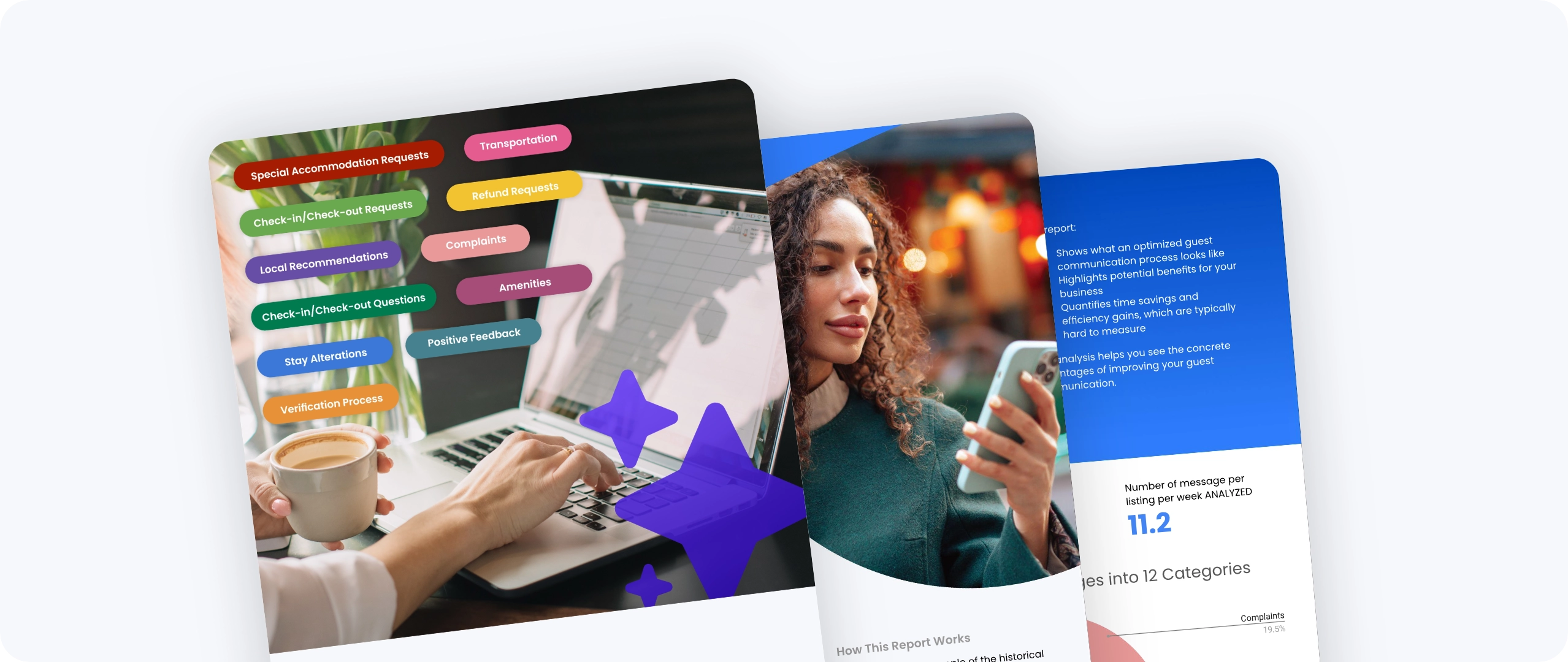

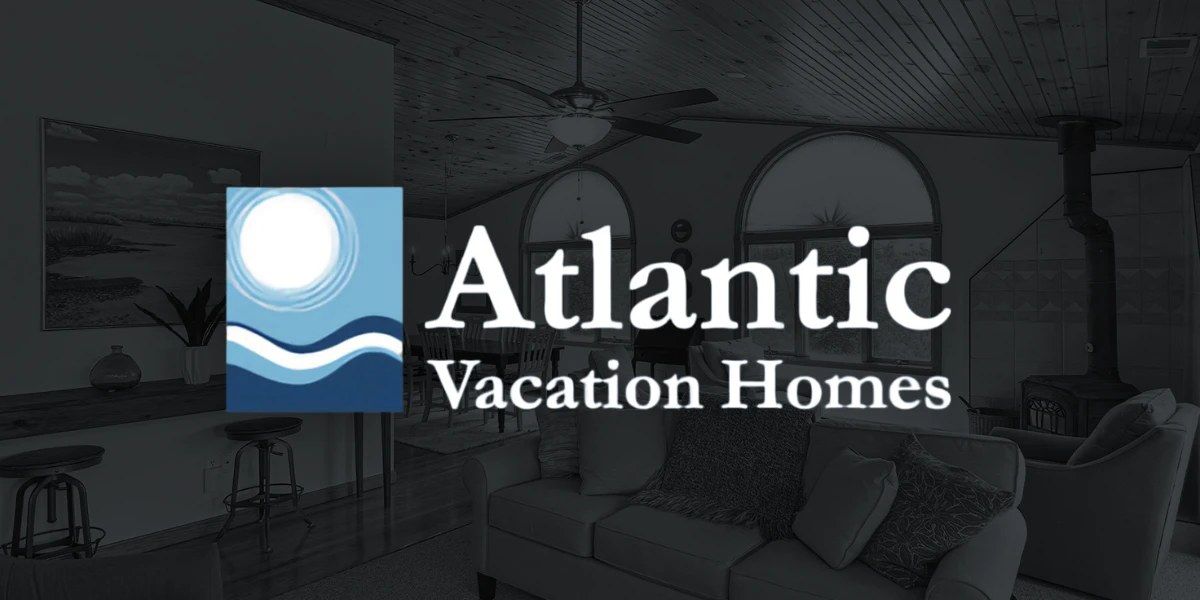

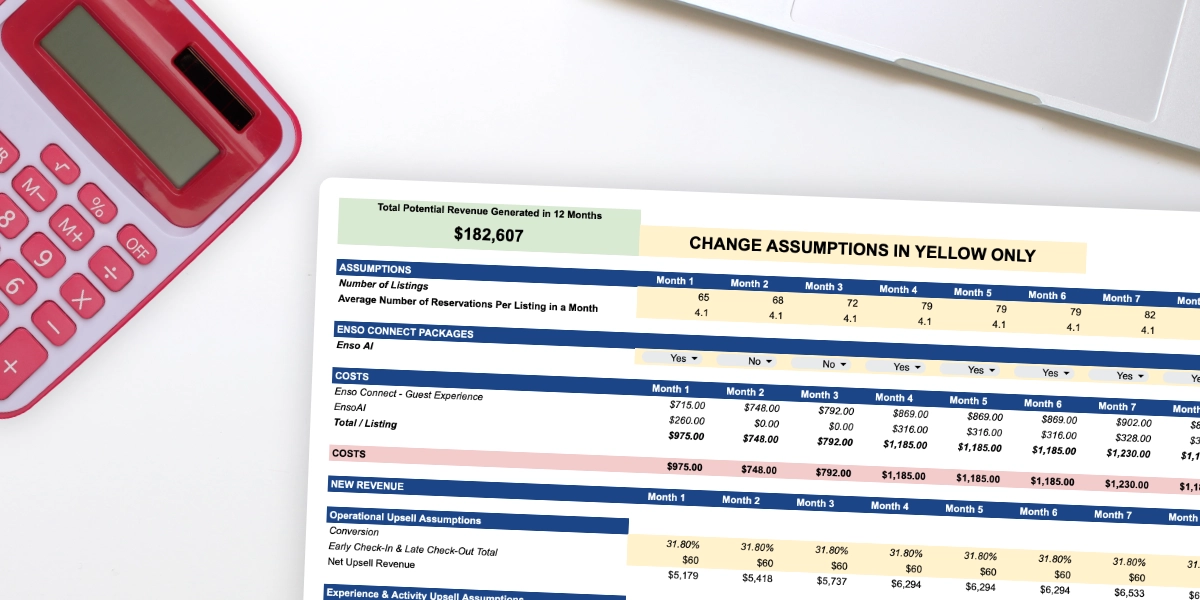
![Implementing AI in Short-Term Rentals [Webinar Recap]](https://gcamkobrlepn-u2971.pressidiumcdn.com/wp-content/uploads/2024/01/Actionable-Steps-to-Implementing-AI-in-a-Short-Term-Rental-Business.webp)